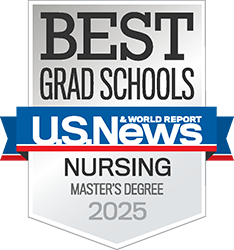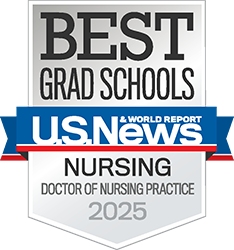

2022 Diaz-Lewis Lecture
Speaker discusses intimate partner violence and Latino immigrants
Acculturative stress weighs heavy among the many factors that contribute to intimate partner violence (IPV) experienced by Latino immigrants, said Rosa Gonzalez-Guarda, PhD, MPH, RN, CPH, FAAN. Nurses can help by working to break down barriers of inequity, she added.
Gonzalez-Guarda delivered the keynote address at the second annual Carla Diaz-Lewis Domestic Violence Lecture at Cizik School of Nursing at UTHealth Houston. She is an associate professor at Duke University and faculty lead for the Population Health Research Area of Excellence of the school’s Center for Nursing Research.
Also during the event, Jason L. Burnett, PhD, described the work of the Texas Elder Abuse and Mistreatment (TEAM) Institute. Burnett is the institute’s co-director and an associate professor in the Joan and Sanford Alexander Division of Geriatric and Palliative Medicine at McGovern Medical School at UTHealth Houston.
The daughter of Cuban immigrants, Gonzalez-Guarda grew up in a close-knit community in Miami. On a mission trip to the Dominican Republic, she witnessed racial discrimination toward Haitian workers. The nuns there, who were also public health nurses, inspired her to pursue her career path. She chose Georgetown University for nursing school because of its global health program, but she soon realized that Latinos in the Washington, D.C., area faced inequities that she had not experienced in her youth.
“I realized I didn’t need to go across the globe to address inequities,” she said. Immigrants face challenges on multiple fronts including language barriers, documentation status, and lack of health insurance. “Intimate partner violence is not only a consequence, it’s an indicator of inequity,” she noted.
Gonzalez-Guarda’s research focuses the intersection of IPV, substance use, HIV, and mental health among Latinos in the United States. She uses the term “syndemic” to describe the interrelated nature of these factors. Her team has found acculturative stress – or struggles adapting to life in the U.S. – to be the strongest predictor of IPV among immigrants from Spanish-speaking countries.
Mitigating factors that can decrease the risk of IPV include ethnic pride, individual resilience, use of coping strategies, and social support. Education is also a protective factor, although Latinos who go to college and move into different professional circles tend to experience more racism than those who don’t, Gonzalez-Guarda noted.
However, she encouraged nurses and researchers to look beyond individual and interpersonal factors to identify and address broader issues.
“How do we remove these structural barriers that are really driving the risk in this population?” she posited.
Elder abuse can also be a domestic violence issue since most abusers are family members, Burnett said.
The TEAM Institute, a part of the UTHealth Houston Consortium on Aging, is a collaboration between the Texas Department of Family and Protective Services’ Division of Adult Protective Services, McGovern Medical School, and other schools at UTHealth Houston.
The institute comprises four multidisciplinary divisions that work together to prevent abuse, neglect, and exploitation of older adults and improve the lives of those who have experienced it. TEAM has developed tools for health care professionals to screen for elder abuse, a program through which health professions students reach out to older adults by phone, an elder abuse fatality review team, and a financial exploitation team that incorporates the expertise of forensic accountants.
Burnett and Gonzalez-Guarda spoke as part of a lectureship series established through a gift from Carla Diaz-Lewis and her husband, Kenneth Lewis. Its aim is to teach health care providers and community members how to identify and assist victims of domestic violence.
Mrs. Diaz-Lewis serves on the board of directors for Aid to Victims of Domestic Abuse, a nonprofit organization focused on family violence intervention and prevention, and Mr. Lewis is a member of the Cizik School of Nursing Advisory Council and UTHealth Development Board.
(In 2023 lecture, three experts address elder abuse, mistreatment, and exploitation.)





